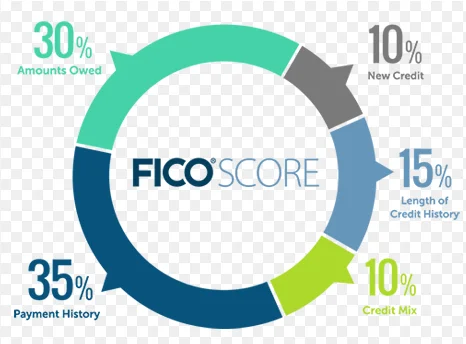
Credit scores are a mathematical representation of your creditworthiness, or in other words, your likelihood of defaulting on your credit obligations. The higher your credit score, the better credit risk lenders see you as, which results in more favorable credit terms, interest rates, etc.
Not all credit scores are created equal. Experian, Equifax, and TransUnion are the national credit repositories. Experian and Equifax have over 15 different scoring models depending on the industry, and TransUnion has over 20. The scoring models are customized to relate to specific industries like auto financing or credit card issuance.
The mortgage industry has its own scoring model, which my experience is that it is more stringent than other industry scoring models. When clients represent their credit score that they received from a credit score monitoring service, I generally find their mortgage specific credit score to be lower. A perfect score is 850, with 300 generally accepted as the lowest score. In 30 plus years, I have never seen either one. There are five main categories that comprise your credit score:

Your credit scores consider both positive and negative information in your credit report. The percentages in the chart reflect how important each of the categories is in determining how your credit scores are calculated. The importance of these categories may vary from one person to another.
Your credit scores consider both positive and negative information in your credit report. The percentages in the chart reflect how important each of the categories is in determining how your credit scores are calculated. The importance of these categories may vary from one person to another.
Your credit scores are unique, just like you. They are calculated based on the five categories referenced above, but for some people, the importance of these categories can be different. For example, scores for people who have not been using credit long will be calculated differently than those with a longer credit history.
In addition, as the information in your credit report changes, so does the evaluation of these factors in determining your credit scores. Your credit report and credit scores evolve frequently. Because of this, it's not possible to measure the exact impact of a single factor in how your credit score is calculated without looking at your entire report. Even the levels of importance shown in the credit scores chart above are for the general population and may be different for different credit profiles.
Your credit score is calculated only from the information in your credit report. However, lenders may look at many things when making a credit decision, such as your income, how long you have worked at your current job, and the kind of credit you are requesting. It is not uncommon for a borrower to tell me they are a good credit risk because they make X dollars per year or have Y dollars in the bank. Neither of those directly impact your credit score. How you utilize those resources certainly does, however.
Let’s dive a little deeper into the 5 categories.
Payment history (35%)
The first thing any lender wants to know is whether you've paid past credit accounts on time. This helps a lender figure out the amount of risk it will assume when extending credit. This is the most important factor in a credit score. Research shows that past payment performance is the strongest predictor of the likelihood that you will pay your debts as agreed.
Everything from credit cards, car loans, installment loans, finance companies and mortgages are all part of the accounts considered. Public record items like bankruptcies, lawsuits, tax liens, and foreclosure are serious items that fall under this category1. In general terms, severity and recency play into the impact of these events. An extremely recent blemish will have greater impact than a similar event years ago. Likewise, the severity of the event will also be factored into how heavily it is weighted. A 90-day late payment on a mortgage will have more impact than a similar offense on a less significant account. Further, the total number of delinquent accounts vs. the number of accounts being paid as agreed will also have a bearing on this category.
The best way to improve a credit score in this arena is to simply pay your bills when they are due, and if you have issues to contact the creditor and work with them to resolve the issue.
Amounts Owed (30%)
Having credit accounts and owing money on them does not necessarily mean you are a high-risk borrower with a low credit score. However, if you are using a lot of your available credit, this may indicate that you are overextended—and banks can interpret this to mean that you are at a higher risk of defaulting. In a very general sense, Amounts owed refers to how much debt you carry in total. However, the amount of debt you have is not as significant to your credit score as your credit utilization. When a high percentage of a person's available credit is being used, this can indicate that a person is overextended, and is more likely to make late or missed payments.
Here are 5 factors that the amount owed category looks at:
· The amount owed on all accounts. Even if you pay your cards off in full each month, the amount on your last statement is likely what the credit bureau will report.
· The amount owed on different types of accounts. In addition to the overall amount you owe, the types of accounts you have are considered, such as installment loans or credit cards.
· How many accounts have balances. A larger number of accounts with amounts owed can indicate higher risk.
· Credit Utilization ratio on revolving accounts. A high percentage of available credit being utilized has a large impact on credit scores. In certain cases, low credit utilization ratio has a more positive impact on your credit scores than not using the card at all.
Paying down balances and keeping the utilization level low can have an immediate impact on your credit score. Various numbers are cited; 50% or lower, 30% or lower. Keeping those percentages low has a very positive impact on your credit score.
Length of Credit History (15%)
Generally, a longer credit history is a positive for credit scores but is not necessary to achieving a good credit score. Here are some things credit scores consider:
It is not imperative to have a lengthy credit history to have a good credit score, although it certainly doesn’t hurt. Establishing credit can be difficult as you must show credit history to get new credit, but how do you get started? Many banks offer secured credit cards which will report like a regular revolving account, which is a start. Perhaps a trusted friend or family member could co-apply with you to help you get going. In any case, treat each account carefully as you build your credit history.
Credit Mix (10%)
The credit score will consider the mix of your credit cards, retail accounts, installment loans, finance company account, and mortgage loans. It is not necessary to have one from each category. Creditors like to see that you can manage the various types of accounts you have and pay timely in each category. Because it is a very small percentage of your credit score, it isn’t necessary to go out and start applying for credit everywhere. The multiple inquiries will adversely impact your credit score. For creditors, it stands to reason that the better you manage different loans and lines of credit, the lower their risk when lending you money.
New Credit (10%)
Research shows that opening several credit accounts in a short amount of time represents a greater risk—especially for people who don't have a long credit history. Your credit scores look at how many new accounts you have by type of account. They may also look at how many of your accounts are new accounts. Don't open new accounts too rapidly. If you've been managing credit for a short time, don't open a lot of new accounts too rapidly. New accounts will lower your average account age, which will have a larger effect on your FICO Scores if you don't have a lot of other credit information. Even if you have used credit for a long time, opening a new account can still lower your FICO Scores.
Alternative Credit
In certain cases where a borrower has no credit history whatsoever, whether they just moved here from another country or are newly out of college and haven’t established credit, there are mortgage options for them. Alternative credit is a term used to describe putting together a credit history from accounts that do not report to the credit bureaus but are monthly obligations that reflect a payment history. Some programs will allow this type of credit history. Generally, we provide proof of timely payments over the period of a year, and present this to the lender in lieu of a credit report. They are:
· Monthly Utility payments
· Cell Phone bills
· Cable TV
· Garbage service
· Rent
· Storage locker
· Private Auto loan
· Internet service
Credit scores and credit history are essential components of the mortgage equation. High credit scores allow homeowners to enjoy better terms, lower interest rates, lower reserve and down payment requirements, to name a few. While there is no substitute for the positive impact of timely payments on credit accounts over an extended period, there are some other ways to improve credit scores immediately. Hopefully understanding these concepts will help you position yourself in the best light possible and that your credit score will be your ally and not your foe.
If you are considering obtaining a mortgage and want to understand your ability to qualify, or need an analysis of your credit worthiness, contact me and we can explore your qualifications. If you can move forward presently, great, or if you have some areas that need to be addressed, we can put a game plan together to help you reach your goals. It all starts with an accurate view of the present situation.
1 See Major Credit Events